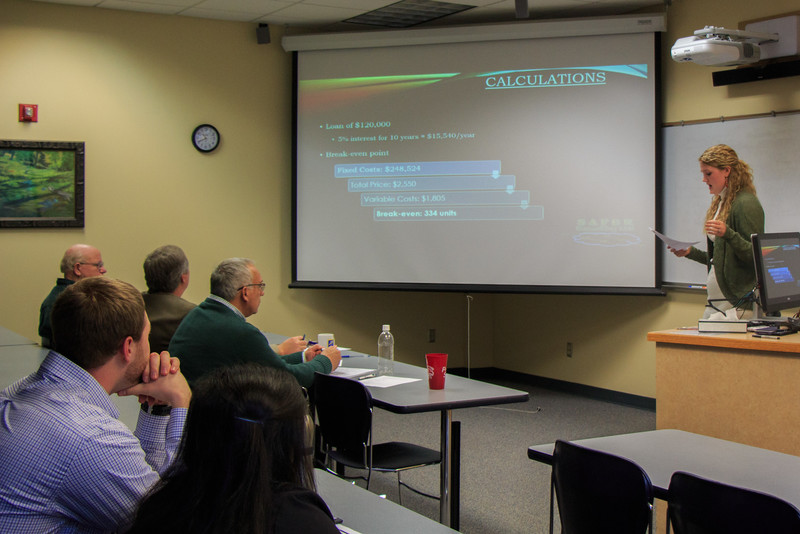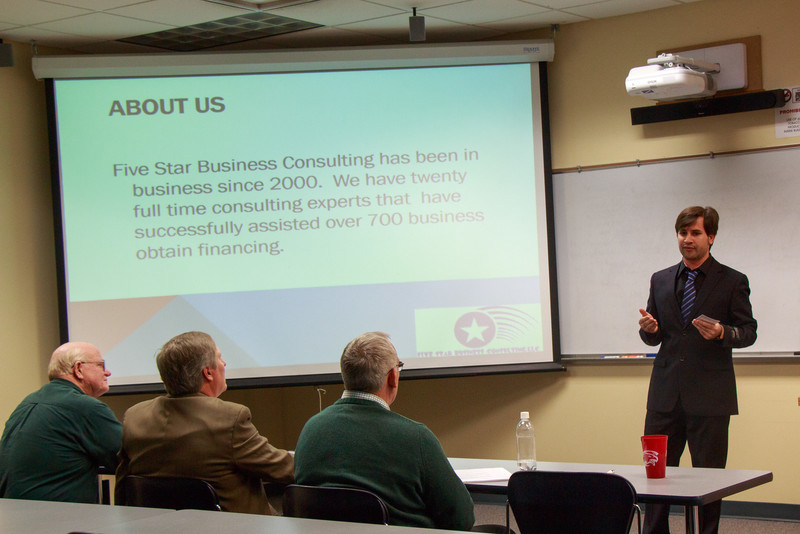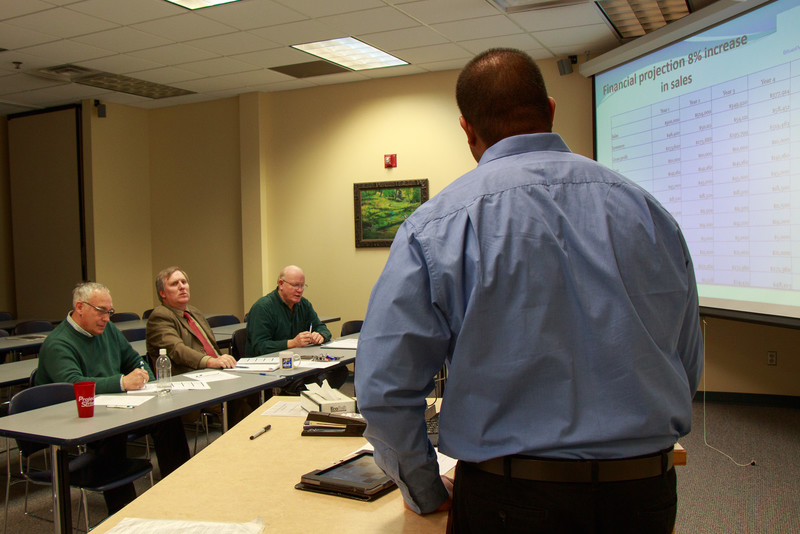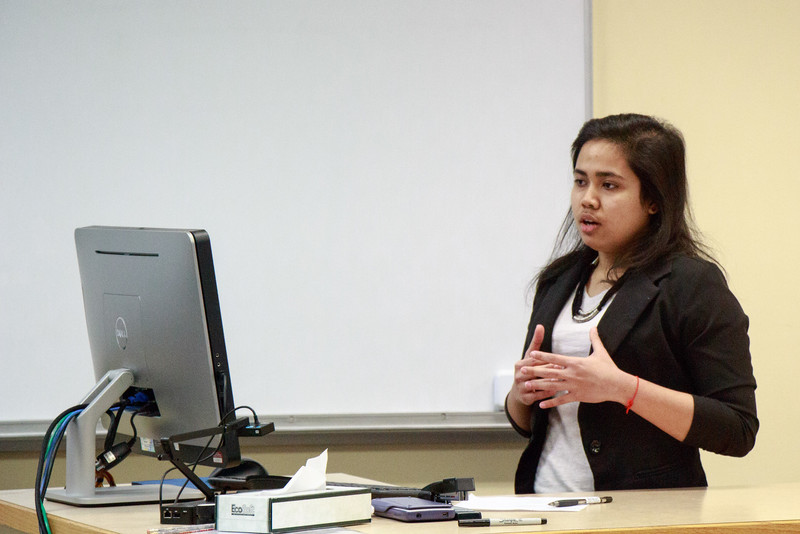On-campus MBA students participate in classroom version of 'Shark Tank'
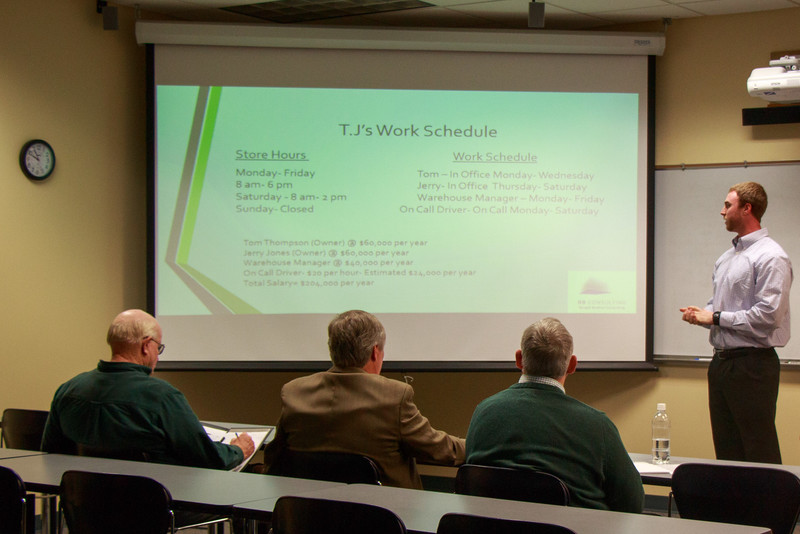
In late February, five students enrolled in the face-to-face Master of Business Administration program, presented business financial plans to a panel of three judges emulating the popular TV show “Shark Tank.”
The judges were Clayton Riesen, a vice president with Farmer’s State Bank, Dr. Tim Donahue, faculty member and director of the Nebraska Business Development Center, and Dr. Rick Koza, instructor of the course.
Koza said he adopted the style of “Shark Tank” to step up the competitive nature of the assignment.
In advance of their presentations, students were instructed that they were to play the role of a business consultant hired by Tom Thompson and Jerry Jones who want to open a small appliance and electronics store.
The two entrepreneurs have experience and knowledge in their fields. Other facts about the inventory, sales floor space and storage space were also provided in the assignment.
Each student’s 10-minute presentation and Q&A afterward was graded by the panel, each other and themselves. Grading criteria included the speaker’s preparedness, ability to answer questions and visual displays.
The students who participated were Jessica Safer of Cheyenne, Wyoming, Kellie Aye of Yangon, Burma, Zac Bargen of Chadron, Nebraska, Charith Kapukotuwa of Chilaw, Sri Lanka, and Sayed Sabir of Kabul, Afghanistan. Safer will graduate in August 2015 and Aye in December 2015. The other three students are in the first year or first semester of the program.
Aye said she appreciated the chance for this type of interaction with classmates and faculty. She proposed a store in Yankton, South Dakota, selling and upgrading cell phones for farmers and ranchers.
“I felt like I was trying to tell the story of my business to the bankers. I was trying to amaze them with my ideas. It was intimidating having a local banker in class, but I experienced what it would be like to go to the bankers and ask for loan. The business plan and financial plan I put together required so much time, but I learned that it is a necessary step that start-up businesses need to take.” Aye said.
Safer pitched her business plan for a used appliance story catering to college students in Laramie, Wyoming.
“I honestly have to say it’s one of the most applicable, real life experiences I’ve had here at Chadron as the panel members’ advice and critiques helped me to see where I did well and where I need to improve. Yes, all the classes here give you needed information for your career field. But it’s the hands-on, businesslike situations that most prepare us for the real world. I’m thankful for how life like Dr. Koza made this project as it has given me great insight to the financial side of starting up a new business, as well as what the process would be like in requesting a start-up loan from the bank,” Safer said.
Bargen presented his clients’ plan for a wholesale appliance distribution center for hotel chains located in Papillion, Nebraska. Kapukotuwa proposed a plan for a store in Great Bend, Kansas, and Sabir offered a plan for an appliance store in Chadron, Nebraska.
The faculty panel members spoke highly of the group. Donahue, who has used an intensive panel style interview in his classroom for 30 years, said it shows the students a glimpse of the difference between textbook learning and real-world business.
“They were creative, and for rookie developers, they did well. Overall, they were well prepared. These kinds of presentations are always eye-opening and enjoyable. It helps round out the students. Participating in a mock business plan presentation is a great way to help students understand the differences between talking about starting a business and actually developing a plan to make it happen,” Donahue said.
Koza said he was pleased with the serious approach the students took in their roles as professional consultants.
“This experience was fantastic for students. The experience allowed students to present their ideas and also to listen to how other students approached a similar topic. Not only did this test how well individual students did on a project but it also had a competitive atmosphere,” Koza said.
Riesen quizzed the students about various details in their profit and loss estimates including profit margins, online sales, utility costs, remodeling expenses, inventory turnover, salaries, benefits and travel.
—Tena L. Cook, Marketing Coordinator
Category: Campus News

